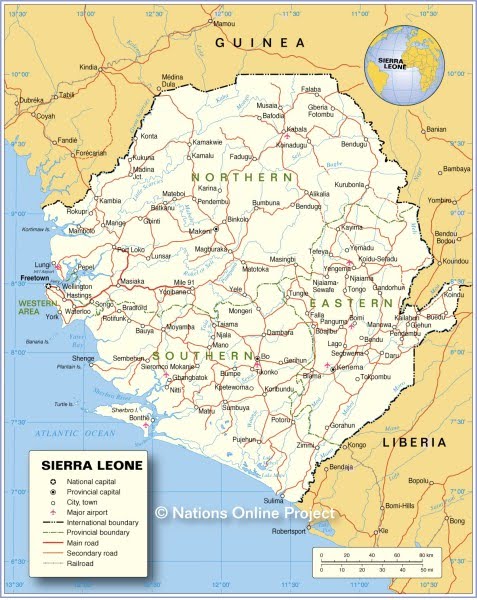
Transforming Public Health, Family Wellbeing and National Security
Health: When we arrived at Lungi Airport, Freetown just over three weeks ago, Peter was stopped by health authority officials who asked for his yellow fever certificate. On producing a wad of travel health papers we were quickly waved through and assumed it was an example of over -zealous officialdom. However this week the World Health Organisation has just announced the start of a programme to address the world’s highest incidences of yellow fever which are found in the West African states of Benin, Liberia and Sierra Leone.
Yellow fever , which is incurable but preventable, is carried by mosquitoes and produces symptoms of jaundice, fever and lethargy . With previous mass vaccinations having been conducted almost forty years ago, there is an urgent desire to address the needs of 12 million people who are spread across the three countries beginning with infants and young children. We have already seen evidence of the vaccination programme conducted by a team of health workers operating alongside a mini-market of informal traders at the road at a busy intersection in the city. We look forward to hearing the results of global initiative which has the potential to prevent illness and premature death.
Wellbeing: When friends and acquaintances heard we were coming to Sierra Leone, several of them gave us an assortment of details, letters, money and medication to deliver to persons who had clearly been significant in their own lives in recent decades, in the hope that we might be able to extend those relationships. Progress has so far been slow but one example is more than worthy of sharing.
In the late 1970s when was Salone was the recipient of a large number of inter-continental tourists, a “beach boy” (his words) Sam, a married man, was working for a seaside hotel resort and made a huge impact on a holidaying couple from the UK, in two consecutive years. This led to Sam Conteh being invited to study for two years at Stoneleigh Agricultural College in England and also spending time working on the same couple’s farm. This established a relationship which has been maintained despite the turbulent decade long war and resulted in Sam’s three children being given names as an expression of his gratitude. Finding Sam’s house where he lives with his wife, Koto, and children was proving problematic despite their address being on the same road. Old Railway Line Road is narrow, runs for over two miles, climbing to around two hundred feet and the house numbering is not sequential. It was therefore a delight and a relief to make contact with the Conteh family and learn of how the continuing relationship with a UK family has shaped the life of the family in such a meaningful way. Sam is employed as the head gardener in a British military training camp, IMATT which is located on a hill close to the embassy of United States of America which we have referred to in earlier letters.
Military. As avid listeners of the BBC World Service for Africa, we have heard of the start of the long awaited inquiry into the war in Iraq and are aware that it is not likely to change the British public’s opinion of it being a highly inappropriate military action taken by the then Prime Minister, Tony Blair. In Salone you will not hear a negative comment on the same leader’s decision to send British troops into a war that after a decade of barbarity had resisted the peace initiative combined force from West African nations, and would not be resolved by any others means. The highly successful military intervention then led to the formation of IMATT, (International Military Advisory and Training Team) . From a strength of several thousand initially, there are but 40 officers who will oversee the completion of the programme following the next national elections in 2012. On a visit to the camp organised by Sam and conducted by a Scottish sergeant, we learned that members of Royal Sierra Leone Armed Forces are being trained for service in the Darfur region of Sudan. This will involve serving alongside others forces within the African Union.
Each of these three snapshots in their own way demonstrate the impact of intervention, be it small or large. Thankfully, all three accounts are transformative. Sadly this is not always the case.

P & J Thanks for this . Hope Tony B's past good work out there gets publicity here - could do with it just now .
ReplyDeleteRyan Giggs of S L extraction has visited and commented on its poverty see timesonline.co.uk/giggs and
unicef.orguk/ryan